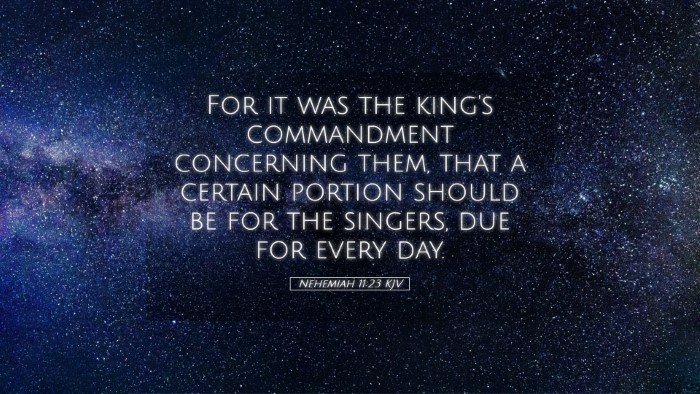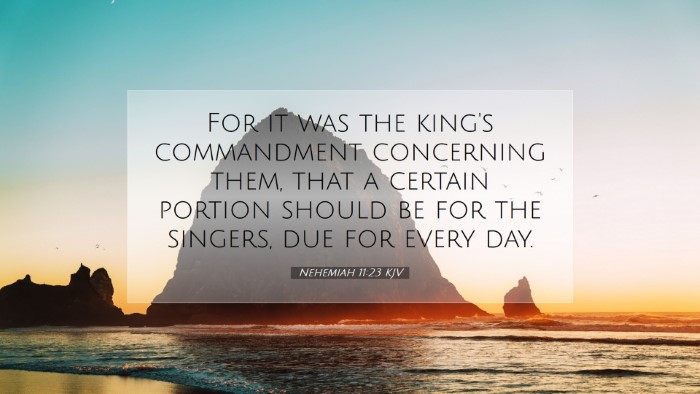Commentary on Nehemiah 11:23
Nehemiah 11:23 states: "For it was the king's commandment concerning them, that a certain portion should be for the singers, due for every day." This verse reflects both the organizational efforts of Nehemiah and the significance of worship in the life of the returned exiles. The insights from public domain commentaries provide a rich tapestry for understanding this text in its historical and theological context.
Historical Context
The book of Nehemiah is set during the post-exilic period when the Israelites were returning to Jerusalem to rebuild their lives and restore their community. The efforts of Nehemiah were focused not only on rebuilding the walls but also on reestablishing the spiritual and social fabric of the community.
-
Nehemiah's Leadership: Nehemiah's commitment to God and his drive for leading his people through significant reforms are noteworthy. He faced considerable opposition yet remained resolute.
-
Worship Restoration: The inclusion of singers in the daily life of the community indicates a return to worship practices that were integral to the life of Israel. The provision for the singers underscores the importance of music and worship in expressing devotion and in maintaining the cultural identity.
Theological Significance
This verse signifies more than just an administrative decision; it implicates the divine purpose in ordaining a structured worship system. The presence of singers and their appointed provisions enhances the spiritual life of the community.
-
Divine Command: The phrase "it was the king's commandment" points towards God's providential hand in the affairs of the Persian empire, whereby even secular authority plays a role in fulfilling God's purposes in Israel.
-
Music in Worship: The role of singers indicates the place of music in worship. Music has been an essential means of expressing praise and adoration to God, a theme that resonates throughout Scripture. This section highlights the ongoing practice of venerating God through song, a tradition that persists in the church today.
Commentary Insights
Matthew Henry's Commentary
Henry emphasizes the necessity of order in worship and how the singers had their appointed places and provisions, reflecting God's care for the ministry. Worship, especially through music, requires organization to ensure that it honors God and edifies the community.
Albert Barnes' Notes on the Bible
Barnes notes that the king’s command not only provided sustenance for the singers but also underlines their vital role in maintaining the worship life of the community. Barnes highlights the strategic foresight of Nehemiah in relying on Persian authority to support the rebuilding efforts, thereby reinforcing the importance of spiritual oversight through worship leaders.
Adam Clarke's Commentary
Clarke reflects on the significant distinction of the singers’ role within the newly reestablished community. He notes that the regular provision for them signifies the corporate worship of the community and suggests that the king’s support affirms the importance of worship in society. The structure provided by Nehemiah’s administration indicates that worship should be prioritized, as it is central to the welfare and unity of the people.
Application for Today
In today’s church context, Nehemiah 11:23 serves as a reminder of the importance of structured worship and the roles individuals play within the community of faith. Pastors and leaders can draw lessons from Nehemiah's example to foster a culture that values and prioritizes worship, ensuring that appropriate resources and support are given to those who lead music and other forms of worship.
-
Encouragement of Worship Leaders: Just as singers were supported in Nehemiah's time, contemporary churches need to invest in their worship leaders, recognizing their crucial role in the spiritual life of the congregation.
-
Integration of Worship in Community Life: Worship should be woven into the daily fabric of life, encouraging both personal and corporate worship experiences through music and praise.


